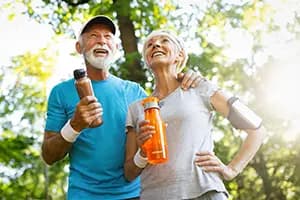August 20, 2020
The Hidden Dangers Of Senior Dehydration
Dehydration is a severe health risk for seniors. As we age, our sense of thirst begins to decrease, and this puts those with dementia and Alzheimer’s at particular risk for dehydration. Learn to spot the symptoms of dehydration before it becomes dangerous. Causes Of Dehydration On top of losing our sense of thirst, we begin […]

Dehydration is a severe health risk for seniors. As we age, our sense of thirst begins to decrease, and this puts those with dementia and Alzheimer’s at particular risk for dehydration. Learn to spot the symptoms of dehydration before it becomes dangerous.
Causes Of Dehydration
On top of losing our sense of thirst, we begin to lose our ability to retain water due to loss of kidney function. An inability to conserve bodily fluid means the slightest changes in hydration can impact seniors.
Other causes of dehydration in seniors include:
- Health conditions: Seniors with Alzheimer’s and dementia often have trouble swallowing, impacting their eating and drinking habits.
- Chemotherapy: Side effects, like vomiting, can quickly result in dehydration.
- Medications: Diuretics, laxatives, and blood pressure medications can throw off the body’s fluid balance and impact urination, perspiration, and dry mouth.
Signs Of Dehydration
Early signs of dehydration:
- Dry mouth or thick saliva
- Headaches
- Dark yellow or brown urine
- Fatigue and weakness
- Headaches
- Inability to produce tears
- Cramped limbs or joint pain
Advanced dehydration symptoms:
- Confusion
- Severe muscle contractions
- Sunken eyes
- Wrinkled skin
- Rapid breathing
- Weak pulse
Dehydration-Related Complications
Seizures: Hydration provides electrolytes that carry electrical signals to your cells. Dehydration creates miscommunication between the electrical signals and can cause muscles to contract.
Brain swelling: If you’re dehydrated then consume lots of water, your brain cells can rupture from the effort of storing the excess fluid.
Kidney failure: Kidneys cannot effectively remove toxins from your body without the proper amount of fluid.
Head trauma or broken bones: Dehydration can cause seniors to pass out, putting them at risk for falls that may cause breaks or fractures.
How To Prevent Dehydration
Sipping fluids throughout the day will keep seniors hydrated, but you may have to get creative if they have trouble swallowing or remembering to drink. Add juice, milk, and sports drinks with electrolytes to ensure proper hydration.
Include foods with high-water content, so seniors continue to consume fluids during their meals. Try foods like:
- Berries
- Watermelon
- Tomatoes
- Squash
- Grapes
- Peaches
- Soup
Talk to your loved one’s care team and physicians to address your concerns and create a plan to ensure they’re getting enough fluids each day.
Call 888-975-1379 or contact Embassy Healthcare online to learn more about our dietary and nutrition services.
